The real cost of bottled water.
See how our bottleless water coolers compare.
Fill out this form or call 844.303.2841 to speak to a local Culligan Quench water expert.
Fields marked * are required.
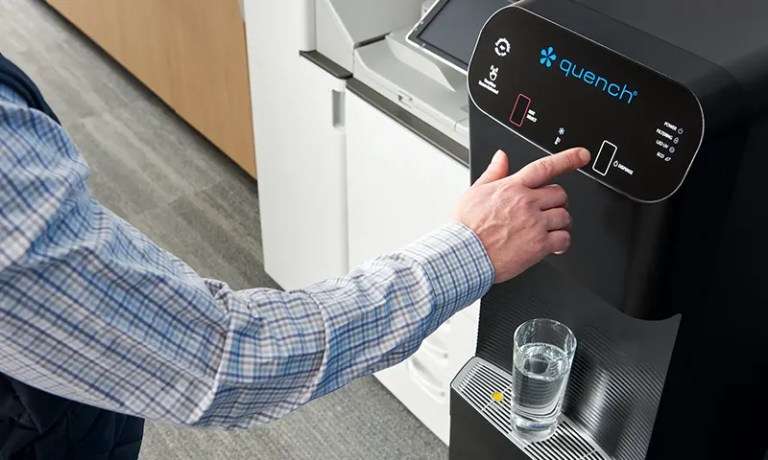
Take on-demand hydration to the next level. Culligan Quench bottleless water coolers and ice machines use advanced filtration and sanitization technologies such as carbon filtration and reverse osmosis to remove sediment, reduce lead and other chemical contaminants, and get rid of off-tastes and odors. By providing filtered water through a broad array of machines, our bottleless water coolers offer users countless consumption choices.
120,000+
customers
500+
service
technicians
80%
cost savings vs
bottled water delivery
1B+
bottles saved
per year
Offer a more sustainable solution for cleaner, better-tasting water on demand.
Fast, efficient, and reliable ice and water machines with advanced filtration.
Bottomless bubbles with built-in filtration for your modern workplace.
Better water makes better coffee. Give your people great-tasting coffee from best-in-class brewers.
Talk to an Pittsburgh Culligan Quench water expert to find the best water solution for your space.
See how our bottleless water coolers compare.
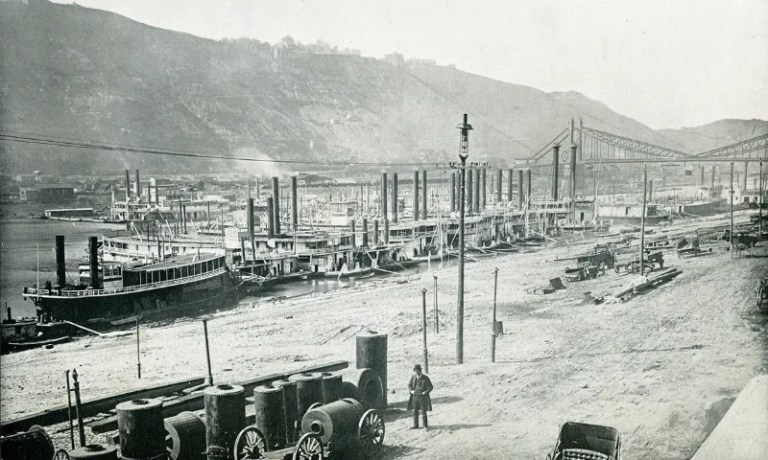
Pittsburgh has relied on the Allegheny River as a steady source of drinking water as far back as its original residents, the Iroquois, and Lenape tribes. European settlers would inherit the abundant water source. However, by the 17th century, local spring water often tasted of sulfur, and wells, which relied on underground water that could offset the taste, were difficult to dig.
For sanitary reasons and against the ever-present danger of fire, officials established the first formal Pittsburgh water system. By 1802, it consisted of four 47-foot deep wells with pumps. It didn’t take long for the city’s booming population to outgrow this simple system. In 1828, Pittsburgh developers unveiled a river pumping station and a one-million-gallon reservoir. This infrastructure would continue to expand into Pittsburgh’s current water management system.
The 19th century saw another hurdle for the city’s water managers: waterborne illness. Likewise, contamination of the Allegheny reached such disastrous levels that the need for a treatment plant and process became obvious. After years of debate over design, Pittsburgh’s first filtration and treatment plant was constructed in 1907. By the 1950s, Pittsburgh water, formerly only treated with chlorine, needed a purification upgrade. Alum was introduced into the process – until the construction of a full chemical treatment plant arrived in 1962.
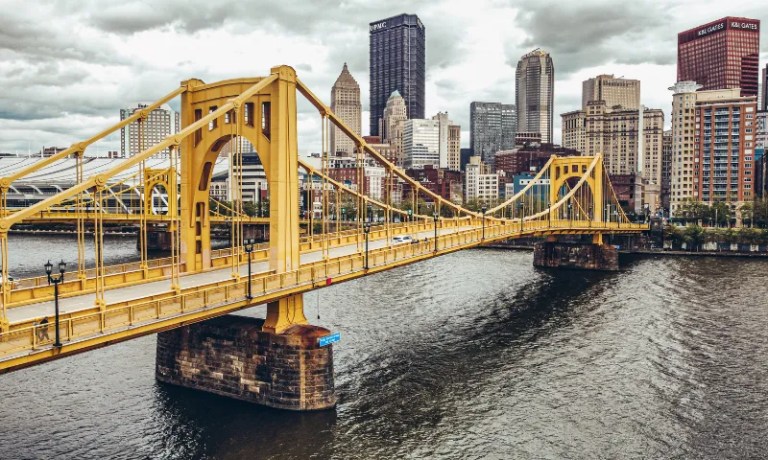
Today, The Pittsburgh Water and Sewer Authority provides service to more than 300,000 customers producing an average of 70 million gallons of water daily. Two facilities treat Pittsburgh tap water: one near Aspinwall and the second, known as the Microfiltration Plant, in Highland Park. Uniquely, the city of Pittsburgh only draws its water from the Allegheny River with no need for groundwater sources. As water travels over the land, it picks up naturally occurring minerals and animal or human pollution. This often manifests as a musty or earthy odor or taste, especially after construction or lots of rain.
According to a recent Pittsburgh Water Quality report, industrial processes, discharge from power plants, the release of petroleum from pipeline ruptures, and stormwater runoff may contaminate drinking water. Like many older cities, most of the Pittsburgh water infrastructure consists of cast iron pipes, the industry standard until the mid-1960s. Prone to corrosion and biofilm, older cast iron pipes develop clusters of corrosion and bacteria along the inside of the pipe. Sometimes these clusters break off and travel with your water to your faucet, resulting in water cloudiness, red water, off-taste, and odor.
Over 120,000 companies, big and small, trust Culligan Quench for cleaner, safer, and great-tasting water.
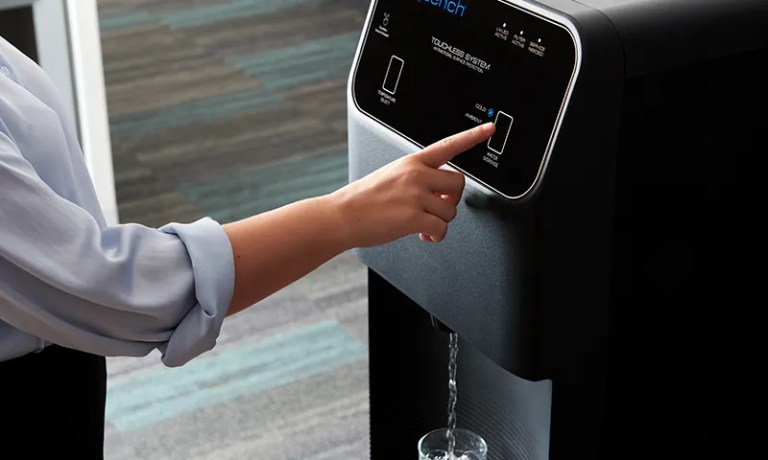
Worried about contaminants in your drinking water? We offer a full complement of water filtration and sanitization technologies to remove sediment, reduce chemical contaminants, including lead, and get rid of off-tastes and odors. Depending on your local water quality, your Water Expert may recommend our NSF-certified carbon filtration, which works great for water with TDS (total dissolved solids) levels under 250 ppm (parts per million) or our NSF-certified reverse osmosis (RO) filtration, which is the standard for water with TDS levels over 250ppm.
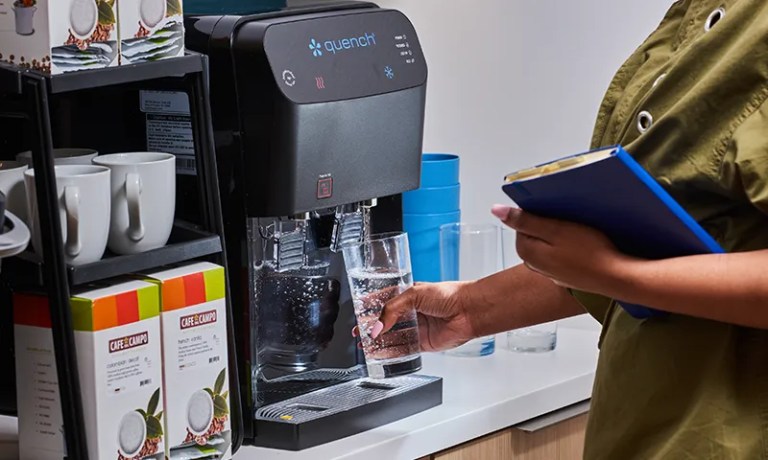
By creating a customized water filtration solution and tailoring your installation and service needs for your business, we can guarantee that Culligan Quench office water coolers produce crisp, clean, great-tasting water – and at a fraction of the price of bottled water delivery services. Go bottle free with Culligan Quench and you will save time, money, and the environment, plus you will have better tasting and safer drinking water!
Backed by 85 years of Culligan expertise, Culligan Quench has focused exclusively on providing businesses with the highest quality filtered water. This commitment to doing one thing well has made us the trusted water authority for over 75% of the Fortune 500. We offer the best bottleless water coolers, ice machines, sparkling water dispensers, and coffee brewers to fit any workplace. No matter your location, company size, or industry, we have a filtered water solution that is right for you
Play VideoProudly providing businesses with clean, filtered drinking water in the greater Pittsburgh Metro Area, including Allegheny, Armstrong, Beaver, Butler, Washington, Westmoreland, Fayette counties.
906 Parkway View Dr, 31a, Pittsburgh, PA 15205
844.303.2841
| Mon: | 8 AM – 8PM |
| Tues: | 8 AM – 8PM |
| Wed: | 8 AM – 8PM |
| Thur: | 8 AM – 8PM |
| Fri: | 8 AM – 8PM |
| Sat: | Closed |
| Sun: | Closed |